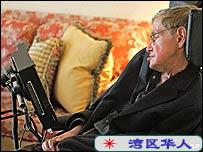The British physicist Stephen Hawking is to embark on a zero-gravity flight in a specially modified plane.
The jet simulates the experience of weightlessness during 25-second plunges over the Atlantic Ocean.
During these plunges, Professor Hawking will float free, unrestricted by his paralysed muscles and his wheelchair.
US firm Zero Gravity normally charges a fee of £1,915 ($3,750) for its passengers, but that fee has been waived for the Cambridge physicist.
He was not given many years to live when he was diagnosed with motor neurone disease in the 1960s, aged 22.
Long-held ambition
"I have wanted to fly in space all of my life," said Professor Hawking.
"For someone like me whose muscles don't work very well, it will be bliss to be weightless."
The 65-year-old will float free during one or more parabolic manoeuvres aboard a specially modified Boeing 727 at 1800 GMT on Thursday.
The plane will take off and land from the space shuttle's runway at Nasa's Kennedy Space Center in Florida.
Hawking's aides will lift him out of his chair and place him gently on the floor of the plane during the sharply angled climb into the sky, in preparation for the first plunge.
Other plunges will be made only after the two doctors and three nurses who are accompanying him have made sure he is not suffering any ill effects.
Mission success
The jet's interior is padded to protect the weightless fliers and equipped with cameras to record their adventure.
"We consider... having him weightless for 25 seconds as a successful mission," said Peter Diamandis, chairman and CEO of Zero Gravity Corporation.
"If we do more than one, fantastic."
Hawking is one of the best-known theoretical physicists of his generation. Some of his groundbreaking work focuses on black holes and on the origins of the Universe.
He has at least one other motive for taking the weightless flight: he believes private space ventures are vital to reduce the cost of space tourism and make it accessible to a greater number of people.
"I think the human race doesn't have a future if it doesn't go into space," Professor Hawking told the BBC News website.
Hawking has a reservation for a sub-orbital flight that is scheduled to begin service in 2009.
In November last year, he told the BBC: "My next goal is to go into space; maybe Richard Branson will help me."
Sir Richard's Virgin Galactic business will own and operate at least five spaceships and two mother ships, and will charge £100,000 ($190,000) to carry passengers to an altitude of about 140km on sub-orbital space flights.
图片:_42849437_shawk_ap_203body.jpg
